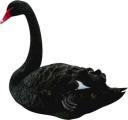
I’m in the midst of reading The Black Swan: The Impact of the Highly Improbable by Nassim Nicholas Taleb. So far I’m finding it a fun read, it touches on the same themes he introduced in Fooled By Randomness, (including the reappearance of Taleb dopperganger Nero Tulip) but explores in particular the rare event and more importantly, how we humans aren’t really wired to plan for or to even consider it. I guess Taleb hasn’t met too many pessimists.
Taleb is one of those writers who is able to sustain an intimate and conversational tone even while explaining complex philosophical matters. It often feels like a hushed conversation between you and the author, the only ones in the room who aren’t foolish enough to believe they know anything. In a lot of ways, the style reminds me of Richard Feymann’s memoirs.
Taleb does spend quite a bit of time ranting about ‘the Gaussian’, which he deems an intellectual fraud. I was surprised about how he singles out this foundational statistical concept, especially his concerns about its misuse, given that I was under the impression that most ‘quants’ don’t rely too heavily on classical statistical inference in their work. Although I understand his qualms about all statistical technique, the casual and sarcastic tone of the book leads one to believe that this is more a Taleb hobbyhorse than a real argument against ‘the Gaussian.’
Nevertheless, the book ultimately has a positive message, namely that although we cannot be certain of much of anything, we can at least bask in the good fortune that has enabled us to live another day. On a lighter note, Taleb recommends that his audience ‘go to cocktail parties’ (you never know who you might meet) and cultivate serendipity in our lives.
Post a Comment